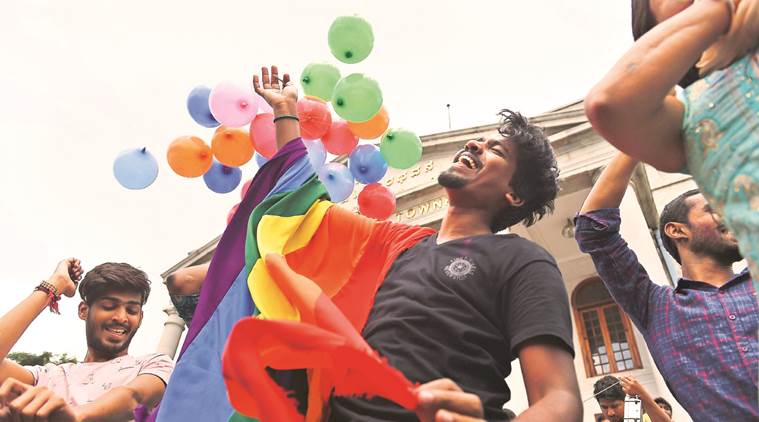No right of way for the majority
By rejecting homogenisation of cultures, Supreme Court’s verdict on Section 377 has upheld the rights of religious minorities.

The judges criticised the imposition of Victorian morality through Section 377.
Last week, the Supreme Court overruled its two judge-bench decision in the Suresh Koushal vs Naz Foundation case (2013) and legalised homosexuality. Justice D Y Chandrachud did not mince words in expressing his displeasure against the government for not taking a categorical stand on Section 377. He said that the law criminalises behaviour that does not conform to the heterosexual expectations of society. Justice Indu Malhotra rightly said that history owes an apology to the homosexual community. It is a different story that we have been unjust to so many sections of our society that an apology is due almost every day.
The judges criticised the imposition of Victorian morality through Section 377. Judeo-Christian morality did cast a big influence on the colonial state’s laws. Islam too considers homosexuality as a sin. Ancient Indian culture and mythology were more liberal. We know of Shikhandi in Mahabharat, Lord Vishnu’s female incarnation as Mohini or Lord Krishna turning into a woman to marry Arjuna’s son Aravan whom no woman was willing to marry because he was doomed to die in a day. Erotic paintings and sculptures in temples depict homosexual impulses of at least certain sections of ancient society. The RSS, in its response to the judgment, has rejected same-sex marriages. In a rare show of unity, the Muslim and Christian clergy are with the RSS on this issue.
Since 377 is a question of criminal law, the Muslim Personal Law Board should neither seek a review of the judgment nor demand a legislative overturning of the verdict. As per Section 2 of the Dissolution of Muslim Marriage Act,1939 a Muslim wife can still seek divorce from a husband who leads an “infamous life,” which may include homosexuality.
Similarly under Section 13 of Hindu Marriage Act, 1955, sodomy is a ground for divorce. Even the Indian Divorce (Amendment) Act, 2001 makes sodomy as a ground for divorce under the Christian law. Even now, the homosexual couple cannot adopt a child and same-sex marriages have not yet been legalised. Many parents have disinherited their homosexual children. Can we now restrict their absolute power to draft such wills? Many more battles remain to be fought. The Supreme Court judgment has merely decriminalised homosexuality but it has not altered the civil law on it. Moreover, there has to be a difference between morality and law. But it is also a fact that in setting aside triple divorce last year, the apex court had noted, “what is bad in theology, cannot be good in law”.
Chief Justice of India Dipak Misra has said that self-determination lies at the core of the concept of identity. The CJI has rightly said that our attitudes and mentality have to change and we must respect individuals for “who they are”, rather than compelling them to become “who they are not”. Those who advocate the regressive idea of “one nation, one religion, one law, one language” are likely to be shocked at this bold recognition of diversity and distinct identities. The mainstreaming of cultures has been rejected by the court. The Constitution under the doctrine of “transformative constitutionalism” has to be progressive rather than regressive. Let our clergy understand it.
The judges have unanimously said that freedom of “choice” cannot be subjected to majoritarian perceptions. Rightist parties would be unhappy to know that popular morality or public disapproval can no longer restrict an individual or the minority’s “choice”. The Supreme Court’s observations in the case on Section 377 will have an impact on the laws in 25 states that ban the sale and consumption of beef. A petition against Maharashtra’s beef law is pending with the apex court. Beef consumption cannot be prohibited now on the ground that the majority community revers cows.
Even the privacy judgment recognised that food preferences are essentially about individual choices. Similarly, there is now a question mark on the constitutionality of half a dozen anti-conversion laws in different states in the country. Changing religion is a private matter and the state cannot have a say in it.
The court struck down Section 377 on a number of grounds that pertain to matters of dignity, identity, health and privacy. It has ruled that consensual sex between adults in private space is neither “harmful’ nor contagious to society”. The Court’s acceptance of the “harm theory” will have an impact on the Triple Talaq Bill that is pending in the Rajya Sabha. This is because after the apex court’s Shayra Bano (2017) judgment, the triple divorce neither dissolves a marriage nor causes any “harm” to anyone. Thus its criminalisation is not tenable.
In his judgment on Section 377, Justice R F Nariman said that punishment of life imprisonment for violating this law was clearly excessive and disproportionate. The three years’ imprisonment for those pronouncing the harmless triple divorce will now be seen an excessive — the punishment for causing death by rash and negligent driving is two years’ imprisonment.
It is common knowledge that court judgments or laws cannot remove social prejudices on their own. The recent judgment on mob lynching is an example. Let us see how the decision on Section 377 works on the ground. However, this verdict will certainly help in removing the burden on sexual minorities. It will usher in “choice jurisprudence” in India; religious minorities will be well within their rights to assert their choices. The Aadhaar judgment is now the apex court’s litmus test on the issue of protecting individual autonomy, privacy and above all, choice.
The writer, an eminent jurist, is Vice-Chancellor NALSAR University of Law, Hyderabad. Views are personal.
For all the latest Opinion News, download Indian Express App
More From Faizan Mustafa
- Supreme Court’s verdict on Section 377: 493 pages, 5 judges, one mantra of Constitutional MoralityHow Supreme Court strikes a powerful blow for freedom and choice, underlines inclusion of all..
- What a petition on citizenship law could mean to Assam NRC updateUnder Article 6 of the Constitution, anyone who migrated to India before July 19, 1948, from territory that had become part of Pakistan, automatically became…
- India and Pakistan: How they differ on key constitutional questionsAs Pakistan begins a new experiment in constitutional democracy, how does its national experience differ from India’s with regard to key aspects of government and…








































No hay comentarios:
Publicar un comentario